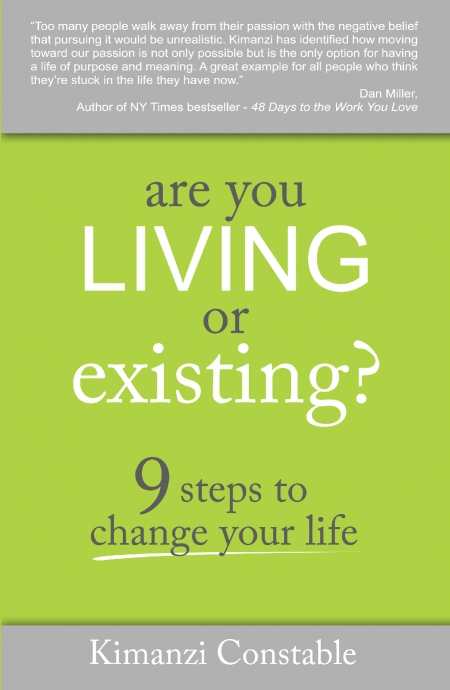Are You Living or Existing?
9 Steps to Change Your Life
With an author “in the same boat” as the reader, this guide encourages proactive action in a conversational tone.
“Are you living or existing?” reverberates from the cover of Kimanzi Constable’s book, daring readers, despite their quality of life, to consider this captivating question. For Constable—author, speaker, and consultant—you are existing if you “get up every day and pretty much do the same things,” while living involves moving forward, making changes, and doing something “new and exciting.”
In a simple, often colloquial (e.g., “Your coworkers are driving you bonkers,” and “So you’re pretty hardcore”) style that helps readers imagine they are in the hands of a trusted friend, Constable shares nine steps to creating a meaningful and fulfilling life. Short chapters filled with advice inspired by the author’s own experiences help readers define their goals, from weight loss to career moves: excise negative people and thoughts, adopt healthy habits, manage money, establish an action plan, and “pay it forward.” Chapters end with a helpful “post-game replay” designed to garner self-reflection and action.
As interesting and insightful as Constable’s personal experiences are, the success of his steps might prove more convincing if he included evidence from scientific research, anecdotes from interviews conducted with others who have found the steps useful, or quotes from well-established self-help leaders. For example, a statement as often used as “begin with the end in mind” could have been attributed to Stephen Covey, helping the reader see how the steps are not just based on personal opinion but also on proven self-help sources.
Constable acknowledges his steps lack novelty, and he assumes the reader is intelligent and well-read enough to gather as much: “You have seen the data; you’ve probably read even more articles than I on eating the right way,” he says in step three on negativity. The book begins with a disclaimer that could, at first glance, discredit everything that follows it. In fact, readers will likely wonder what they can learn from an author who admits he has few credentials. Those who read on will see the book’s strength lies in where the author is situated: “in the same boat with you.” He is tired of existing, too. He wants to leave Wisconsin and move to Hawaii. He struggles with weight gain. He sends negative family and friends packing. In this, he is evolving, just like the reader. Constable is devoted to the steps that lead to living, and he wants to provide a path the reader can follow.
Reviewed by
Kaavonia Hinton
Disclosure: This article is not an endorsement, but a review. The publisher of this book provided free copies of the book to have their book reviewed by a professional reviewer. No fee was paid by the publisher for this review. Foreword Reviews only recommends books that we love. Foreword Magazine, Inc. is disclosing this in accordance with the Federal Trade Commission’s 16 CFR, Part 255.

